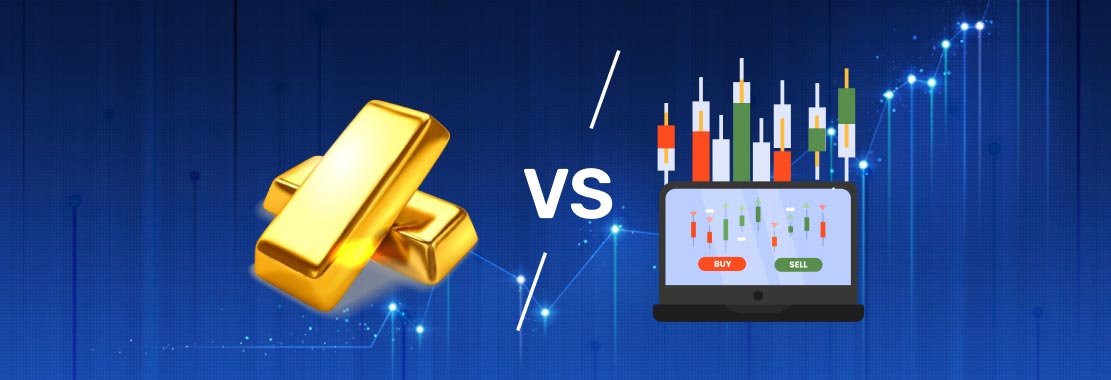Gold and equities are two of the most preferred asset classes by Indian investors. Historically, Indians have invested a lot in gold for various reasons. In the last few decades, more and more Indians have started investing in equities as well.
That said, gold and equities are two fundamentally different asset classes. The main difference is that gold is a commodity; however, investing in equity is akin to owning a company.
Therefore, both these asset classes are quite different from each other. As an investor, you should understand when to invest in gold and when in equities. Read this blog, as it takes a deep dive into the topic of gold vs. equities.
Additional Read: Gold ETFs vs Physical Gold
What is Gold Investment?
Traditionally, most people used to invest in physical gold; they would buy jewellery or gold coins. However, in recent years, a number of other options have emerged for those keen to invest in gold. For example, people can invest in a gold exchange-traded-fund (ETF), which is indexed to the value of gold.
They can buy or sell units of a Gold ETF through their brokerage account. Similarly, they can also invest in a gold mutual fund. There is another interesting option to invest in gold called “sovereign gold bonds,” which were introduced by the Reserve Bank of India (RBI). Investors can buy these bonds in physical, digital, or demat form.
Whether you invest in physical gold or in non-physical gold investments, the performance of your investment is directly linked to the price of gold. If the price of gold moves up, your investment will generate a return for you, and vice versa.
What is Equity Investment?
When you invest in the equity shares of a company, it is called an equity investment. Equity shareholders are the owners of a company to the extent of their shareholding in it. When a company performs well, its share price tends to increase, providing equity shareholders with an opportunity to sell their investment at a profit.
However, when a company does not perform well, its share price may decline, causing a loss to its equity shareholders. The fortunes of equity shareholders are directly linked to those of the companies they invest in.
Apart from appreciation in the share price, there is another way equity shareholders can make a return on their investment, which is called “dividend.” However, most companies trade at a low dividend yield in India. Hence, dividends in most cases should not be the prime reason for buying equity stock of a company.
Additional Read: Dividend Yield Calculator
Understanding Gold-backed ETFs
An exchange-traded-fund (ETF) that tracks the price of domestic physical gold is called a Gold ETF. When you buy units of a gold ETF, those units represent physical gold. That physical gold could be in paper or demat form.
That said, buying units of a gold ETF is like buying units of a mutual fund (MF). You just log in to your brokerage account and invest in a gold ETF the way you would invest in an MF or buy a stock. Essentially speaking, by investing in a gold ETF, you invest in gold without having the hassle of investing in its physical form.
One unit of a gold ETF is equal to one gram of gold. Besides, an investment in a gold ETF is backed by 99.5% pure physical gold bars (highly pure gold). The best part of gold ETFs is that they are traded on the National Stock Exchange (NSE) and the Bombay Stock Exchange (BSE). Hence, you can trade in gold ETF units anytime during market hours.
Gold vs. Equities
Gold and equity can both find a place in your portfolio. However, as asset classes, they are different from each other, as explained below:
Criteria
| Gold
| Equities
|
Nature
| When you invest in gold, whether physical gold, gold ETF or MF, or sovereign gold bonds, you essentially invest in a commodity.
| When you invest in equities, you invest in a company.
|
Performance
| The performance of your gold investments is directly linked to the price of gold. If the price of gold moves up, your investments will perform better, and vice versa.
| The performance of your equity investments depends upon the companies in which you are invested. If those companies perform well, their stock prices will increase and hence you will make money. If those companies do not perform well, your equity investments can lose money.
|
Expected Rate of Return
| Gold tends to provide lesser returns than equities.
| Over a long period of time, equities provide a much higher return than gold.
|
Recession/Growth
| The price of gold tends to increase during economic recessions. As investors panic in a recession, they prefer investing in gold, which increases its price.
| However, stock prices tend to move up during the growth phase of an economy and move down during economic recessions.
|
Pros and Cons of Gold Investment
Pros of gold investment
Safe option during economic uncertainty: When an economy goes through a period of uncertainty due to recession or unprecedented changes, the price of gold tends to increase. Because gold is seen as a safe haven by many investors, its price can increase during periods of uncertainty.
Diversification: Having some investments in gold can help you diversify your overall portfolio. If you invest only in one asset class, the performance of your portfolio depends only on that asset, which can increase your risk. Hence, if you are already invested in stocks, bonds, and other assets, you can consider keeping a portion of your portfolio in gold to reap the benefits of diversification.
Cons of gold investment
Not the best bet for long-term investments: While gold can provide you with decent returns during economic uncertainties, its performance over a long period of time is not great. Hence, if you want to invest for 20-30 years, you should not invest a lot in gold.
Fewer options for providing returns: Investments in gold can provide you with a return only when the price of gold increases. However, when you invest in stocks, you can earn through price appreciation and dividends. Similarly, when you invest in real estate, you can earn through rent and you can sell your property at a higher price.
Conclusion
If you are about to open a demat account, you should learn about various asset classes, specifically, you must learn to thoroughly understand concepts like gold vs. equities. Both gold and equities can have merits and demerits.
Interestingly, both gold and equities can find a place in your portfolio. Before investing in gold, equities, or any other asset, you should be sure of your objective. If your objective is long-term capital appreciation, then equity is your best bet. However, if your objective is to invest during a recession, you can consider gold.
That said, no matter the phase (whether recession or growth), you should not invest your entire portfolio in one asset. Instead, you must always diversify your portfolio based on your short and long-term goals.
Additional Read: How to Open a Demat Account
Disclaimer: Investments in the securities market are subject to market risk, read all related documents carefully before investing.
This content is for educational purposes only. Securities quoted are exemplary and not recommendatory.
For All Disclaimers Click Here: https://bit.ly/3Tcsfuc













